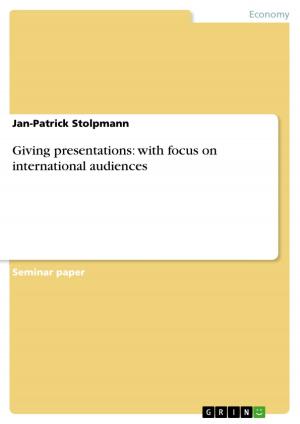| Author: | Michael Helten | ISBN: | 9783638515665 |
| Publisher: | GRIN Publishing | Publication: | July 1, 2006 |
| Imprint: | GRIN Publishing | Language: | English |
| Author: | Michael Helten |
| ISBN: | 9783638515665 |
| Publisher: | GRIN Publishing |
| Publication: | July 1, 2006 |
| Imprint: | GRIN Publishing |
| Language: | English |
Seminar paper from the year 2006 in the subject English Language and Literature Studies - Linguistics, grade: 1,3, University of Freiburg, course: HS Morphology, 20 entries in the bibliography, language: English, abstract: As one of its most important theories, Functional Typology (FT) is a highly empirical approach to all fields of linguistics. Joseph Greenberg of Stanford University, the classic representative of FT, wrote Language Universals, the seminal work that constituted FT, in 19661. FT is called typology because it classifies languages into types according to their features as opposed to generic classifications that group languages according to their language families. It is called functional because it searches for universal tendencies in languages based on the assumption that these tendencies are brought about by the need to fulfill certain functions in communication. FT is thereby the counter approach to Generative Grammar (Functionalism), which assumes that there is a Universal Grammar every human is born with. As a result of trying to find universal categories of linguistic behavior, functional typologists try to extract valid principles by synchronic empirical testing and generalizations. They call these extracted principles universals. One of these universals is Universal 28: Universal 28: If both the derivation and inflection follow the root, or they both precede the root, the derivation is always between the root and the inflection. According to this Greenbergian universal, we should expect never to see a case in which a root is followed first by an inflectional and then by a derivational suffix. It also excludes cases in which a root is directly preceded by an inflectional prefix which is preceded by a derivational prefix in turn. There appear to be a number of such cases in different languages, however. The goal of this paper is to examine in how far Universal 28 can be saved in view of the cases that have been brought forth in the literature to contradict it. Crucial to this examination will be to first clarify the differences between the central terms 'inflection' and 'derivation', and how the two interact.
Seminar paper from the year 2006 in the subject English Language and Literature Studies - Linguistics, grade: 1,3, University of Freiburg, course: HS Morphology, 20 entries in the bibliography, language: English, abstract: As one of its most important theories, Functional Typology (FT) is a highly empirical approach to all fields of linguistics. Joseph Greenberg of Stanford University, the classic representative of FT, wrote Language Universals, the seminal work that constituted FT, in 19661. FT is called typology because it classifies languages into types according to their features as opposed to generic classifications that group languages according to their language families. It is called functional because it searches for universal tendencies in languages based on the assumption that these tendencies are brought about by the need to fulfill certain functions in communication. FT is thereby the counter approach to Generative Grammar (Functionalism), which assumes that there is a Universal Grammar every human is born with. As a result of trying to find universal categories of linguistic behavior, functional typologists try to extract valid principles by synchronic empirical testing and generalizations. They call these extracted principles universals. One of these universals is Universal 28: Universal 28: If both the derivation and inflection follow the root, or they both precede the root, the derivation is always between the root and the inflection. According to this Greenbergian universal, we should expect never to see a case in which a root is followed first by an inflectional and then by a derivational suffix. It also excludes cases in which a root is directly preceded by an inflectional prefix which is preceded by a derivational prefix in turn. There appear to be a number of such cases in different languages, however. The goal of this paper is to examine in how far Universal 28 can be saved in view of the cases that have been brought forth in the literature to contradict it. Crucial to this examination will be to first clarify the differences between the central terms 'inflection' and 'derivation', and how the two interact.















